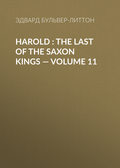
Эдвард Бульвер-Литтон
Alice, or the Mysteries — Complete
CHAPTER VIII
THE more he strove
To advance his suit, the farther from her love.
DRYDEN: Theodore and Honoria.
THE line of conduct which Vargrave now adopted with regard to Evelyn was craftily conceived and carefully pursued. He did not hazard a single syllable which might draw on him a rejection of his claims; but at the same time no lover could be more constant, more devoted, in attentions. In the presence of others, there was an air of familiar intimacy that seemed to arrogate a right, which to her he scrupulously shunned to assert. Nothing could be more respectful, nay, more timid, than his language, or more calmly confident than his manner. Not having much vanity, nor any very acute self-conceit, he did not delude himself into the idea of winning Evelyn's affections; he rather sought to entangle her judgment, to weave around her web upon web,—not the less dangerous for being invisible. He took the compact as a matter of course, as something not to be broken by any possible chance; her hand was to be his as a right: it was her heart that he so anxiously sought to gain. But this distinction was so delicately drawn, and insisted upon so little in any tangible form, that, whatever Evelyn's wishes for an understanding, a much more experienced woman would have been at a loss to ripen one.
Evelyn longed to confide in Caroline, to consult her; but Caroline, though still kind, had grown distant. "I wish," said Evelyn, one night as she sat in Caroline's dressing-room,—"I wish that I knew what tone to take with Lord Vargrave. I feel more and more convinced that a union between us is impossible; and yet, precisely because he does not press it, am I unable to tell him so. I wish you could undertake that task; you seem such friends with him."
"I!" said Caroline, changing countenance.
"Yes, you! Nay, do not blush, or I shall think you envy me. Could you not save us both from the pain that otherwise must come sooner or later?"
"Lord Vargrave would not thank me for such an act of friendship. Besides, Evelyn, consider,—it is scarcely possible to break off this engagement now."
"Now! and why now?" said Evelyn, astonished.
"The world believes it so implicitly. Observe, whoever sits next you rises if Lord Vargrave approaches; the neighbourhood talk of nothing else but your marriage; and your fate, Evelyn, is not pitied."
"I will leave this place! I will go back to the cottage! I cannot bear this!" said Evelyn, passionately wringing her hands.
"You do not love another, I am sure: not young Mr. Hare, with his green coat and straw-coloured whiskers; or Sir Henry Foxglove, with his how-d'ye-do like a view-halloo; perhaps, indeed, Colonel Legard,—he is handsome. What! do you blush at his name? No; you say 'not Legard:' who else is there?"
"You are cruel; you trifle with me!" said Evelyn, in tearful reproach; and she rose to go to her own room.
"My dear girl!" said Caroline, touched by her evident pain; "learn from me—if I may say so—that marriages are not made in heaven! Yours will be as fortunate as earth can bestow. A love-match is usually the least happy of all. Our foolish sex demand so much in love; and love, after all, is but one blessing among many. Wealth and rank remain when love is but a heap of ashes. For my part, I have chosen my destiny and my husband."
"Your husband!"
"Yes, you see him in Lord Doltimore. I dare say we shall be as happy as any amorous Corydon and Phyllis." But there was irony in Caroline's voice as she spoke; and she sighed heavily. Evelyn did not believe her serious; and the friends parted for the night.
"Mine is a strange fate!" said Caroline to herself; "I am asked by the man whom I love, and who professes to love me, to bestow myself on another, and to plead for him to a younger and fairer bride. Well, I will obey him in the first; the last is a bitterer task, and I cannot perform it earnestly. Yet Vargrave has a strange power over me; and when I look round the world, I see that he is right. In these most commonplace artifices, there is yet a wild majesty that charms and fascinates me. It is something to rule the world: and his and mine are natures formed to do so."
CHAPTER IX
A SMOKE raised with the fume of sighs.
Romeo and Juliet.
IT is certain that Evelyn experienced for Maltravers sentiments which, if not love, might easily be mistaken for it. But whether it were that master-passion, or merely its fanciful resemblance,—love in early youth and innocent natures, if of sudden growth, is long before it makes itself apparent. Evelyn had been prepared to feel an interest in her solitary neighbour. His mind, as developed in his works, had half-formed her own. Her childish adventure with the stranger had never been forgotten. Her present knowledge of Maltravers was an union of dangerous and often opposite associations,—the Ideal and the Real.
Love, in its first dim and imperfect shape, is but imagination concentrated on one object. It is a genius of the heart, resembling that of the intellect; it appeals to, it stirs up, it evokes, the sentiments and sympathies that lie most latent in our nature. Its sigh is the spirit that moves over the ocean, and arouses the Anadyomene into life. Therefore is it that MIND produces affections deeper than those of external form; therefore it is that women are worshippers of glory, which is the palpable and visible representative of a genius whose operations they cannot always comprehend. Genius has so much in common with love, the imagination that animates one is so much the property of the other, that there is not a surer sign of the existence of genius than the love that it creates and bequeaths. It penetrates deeper than the reason, it binds a nobler captive than the fancy. As the sun upon the dial, it gives to the human heart both its shadow and its light. Nations are its worshippers and wooers; and Posterity learns from its oracles to dream, to aspire, to adore!
Had Maltravers declared the passion that consumed him, it is probable that it would soon have kindled a return. But his frequent absence, his sustained distance of manner, had served to repress the feelings that in a young and virgin heart rarely flow with much force until they are invited and aroused. Le besoin d'aimer in girls, is, perhaps, in itself powerful; but is fed by another want, le besoin d'etre aime! If, therefore, Evelyn at present felt love for Maltravers, the love had certainly not passed into the core of life: the tree had not so far struck its roots but what it might have borne transplanting. There was in her enough of the pride of sex to have recoiled from the thought of giving love to one who had not asked the treasure. Capable of attachment, more trustful and therefore, if less vehement, more beautiful and durable than that which had animated the brief tragedy of Florence Lascelles, she could not have been the unknown correspondent, or revealed the soul, because the features wore a mask.
It must also be allowed that, in some respects, Evelyn was too young and inexperienced thoroughly to appreciate all that was most truly lovable and attractive in Maltravers. At four and twenty she would, perhaps, have felt no fear mingled with her respect for him; but seventeen and six and thirty is a wide interval! She never felt that there was that difference in years until she had met Legard, and then at once she comprehended it. With Legard she had moved on equal terms; he was not too wise, too high for her every-day thoughts. He less excited her imagination, less attracted her reverence. But, somehow or other, that voice which proclaimed her power, those eyes which never turned from hers, went nearer to her heart. As Evelyn had once said to Caroline, "It was a great enigma!"—her own feelings were a mystery to her, and she reclined by the "Golden Waterfalls" without tracing her likeness in the glass of the pool below.
Maltravers appeared again at the rectory. He joined their parties by day, and his evenings were spent with them as of old. In this I know not precisely what were his motives—perhaps he did not know them himself. It might be that his pride was roused; it might be that he could not endure the notion that Lord Vargrave should guess his secret by an absence almost otherwise unaccountable,—he could not patiently bear to give Vargrave that triumph; it might be that, in the sternness of his self-esteem, he imagined he had already conquered all save affectionate interest in Evelyn's fate, and trusted too vainly to his own strength; and it might be, also, that he could not resist the temptation of seeing if Evelyn were contented with her lot, and if Vargrave were worthy of the blessing that awaited him. Whether one of these or all united made him resolve to brave his danger, or whether, after all, he yielded to a weakness, or consented to what—invited by Evelyn herself—was almost a social necessity, the reader and not the narrator shall decide.
Legard was gone; but Doltimore remained in the neighbourhood, having hired a hunting-box not far from Sir John Merton's manors, over which he easily obtained permission to sport. When he did not dine elsewhere, there was always a place for him at the parson's hospitable board,—and that place was generally next to Caroline. Mr. and Mrs. Merton had given up all hope of Mr. Maltravers for their eldest daughter; and, very strangely, this conviction came upon their minds on the first day they made the acquaintance of the young lord.
"My dear," said the rector, as he was winding up his watch, preparatory to entering the connubial couch,—"my dear, I don't think Mr. Maltravers is a marrying man."
"I was just going to make the same remark," said Mrs. Merton, drawing the clothes over her. "Lord Doltimore is a very fine young man, his estates unencumbered. I like him vastly, my love. He is evidently smitten with Caroline: so Lord Vargrave and Mrs. Hare said."
"Sensible, shrewd woman, Mrs. Hare. By the by, we'll send her a pineapple. Caroline was made to be a woman of rank!"
"Quite; so much self-possession!"
"And if Mr. Maltravers would sell or let Burleigh—"
"It would be so pleasant!"
"Had you not better give Caroline a hint?"
"My love, she is so sensible, let her go her own way."
"You are right, my dear Betsy; I shall always say that no one has more common-sense than you; you have brought up your children admirably!"
"Dear Charles!"
"It is coldish to-night, love," said the rector; and he put out the candle.
From that time, it was not the fault of Mr. and Mrs. Merton if Lord Doltimore did not find their house the pleasantest in the county.
One evening the rectory party were assembled together in the cheerful drawing-room. Cleveland, Mr. Merton, Sir John, and Lord Vargrave, reluctantly compelled to make up the fourth, were at the whist-table; Evelyn, Caroline, and Lord Doltimore were seated round the fire, and Mrs. Merton was working a footstool. The fire burned clear, the curtains were down, the children in bed: it was a family picture of elegant comfort.
Mr. Maltravers was announced.
"I am glad you are come at last," said Caroline, holding out her fair hand. "Mr. Cleveland could not answer for you. We are all disputing as to which mode of life is the happiest."
"And your opinion?" asked Maltravers, seating himself in the vacant chair,—it chanced to be next to Evelyn's.
"My opinion is decidedly in favour of London. A metropolitan life, with its perpetual and graceful excitements,—the best music, the best companions, the best things in short. Provincial life is so dull, its pleasures so tiresome; to talk over the last year's news, and wear out one's last year's dresses, cultivate a conservatory, and play Pope Joan with a young party,—dreadful!"
"I agree with Miss Merton," said Lord Doltimore, solemnly; "not but what I like the country for three or four months in the year, with good shooting and hunting, and a large house properly filled, independent of one's own neighbourhood: but if I am condemned to choose one place to live in, give me Paris."
"Ah, Paris; I never was in Paris. I should so like to travel!" said Caroline.
"But the inns abroad are so very bad," said Lord Doltimore; "how people can rave about Italy, I can't think. I never suffered so much in my life as I did in Calabria; and at Venice I was bit to death by mosquitoes. Nothing like Paris, I assure you: don't you think so, Mr. Maltravers?"
"Perhaps I shall be able to answer you better in a short time. I think of accompanying Mr. Cleveland to Paris!"
"Indeed!" said Caroline. "Well, I envy you; but is it a sudden resolution?"
"Not very."
"Do you stay long?" asked Lord Doltimore.
"My stay is uncertain."
"And you won't let Burleigh in the meanwhile?"
"Let Burleigh? No; if it once pass from my hands it will be forever!"
Maltravers spoke gravely, and the subject was changed. Lord Doltimore challenged Caroline to chess.
They sat down, and Lord Doltimore arranged the pieces.
"Sensible man, Mr. Maltravers," said the young lord; "but I don't hit it off with him: Vargrave is more agreeable. Don't you think so?"
"Y-e-s."
"Lord Vargrave is very kind to me,—I never remember any one being more so; got Legard that appointment solely because it would please me,—very friendly fellow! I mean to put myself under his wing next session!"
"You could not do better, I'm sure," said Caroline; "he is so much looked up to; I dare say he will be prime minister one of these days."
"I take the bishop:—do you think so really?—you are rather a politician?"
"Oh, no; not much of that. But my father and my uncle are stanch politicians; gentlemen know so much more than ladies. We should always go by their opinions. I think I will take the queen's pawn—your politics are the same as Lord Vargrave's?"
"Yes, I fancy so: at least I shall leave my proxy with him. Glad you don't like politics,—great bore."
"Why, so young, so connected as you are—" Caroline stopped short, and made a wrong move.
"I wish we were going to Paris together, we should enjoy it so;" and Lord Doltimore's knight checked the tower and queen.
Caroline coughed, and stretched her hand quickly to move.
"Pardon me, you will lose the game if you do so!" and Doltimore placed his hand on hers, their eyes met, Caroline turned away, and Lord Doltimore settled his right collar.
"And is it true? are you really going to leave us?" said Evelyn, and she felt very sad. But still the sadness might not be that of love,—she had felt sad after Legard had gone.
"I do not think I shall long stay away," said Maltravers, trying to speak indifferently. "Burleigh has become more dear to me than it was in earlier youth; perhaps because I have made myself duties there: and in other places I am but an isolated and useless unit in the great mass."
"You! everywhere, you must have occupations and resources,—everywhere, you must find yourself not alone. But you will not go yet?"
"Not yet—no. [Evelyn's spirits rose.] Have you read the book I sent you?" (It was one of De Stael's.)
"Yes; but it disappoints me."
"And why? It is eloquent."
"But is it true? Is there so much melancholy in life? Are the affections so full of bitterness? For me, I am so happy when with those I love! When I am with my mother, the air seems more fragrant, the skies more blue: it is surely not affection, but the absence of it, that makes us melancholy."
"Perhaps so; but if we had never known affection, we might not miss it: and the brilliant Frenchwoman speaks from memory, while you speak from hope,—memory, which is the ghost of joy: yet surely, even in the indulgence of affection, there is at times a certain melancholy, a certain fear. Have you never felt it, even with—with your mother?"
"Ah, yes! when she suffered, or when I have thought she loved me less than I desired."
"That must have been an idle and vain thought. Your mother! does she resemble you?"
"I wish I could think so. Oh, if you knew her! I have longed so often that you were acquainted with each other! It was she who taught me to sing your songs."
"My dear Mrs. Hare, we may as well throw up our cards," said the keen clear voice of Lord Vargrave: "you have played most admirably, and I know that your last card will be the ace of trumps; still the luck is against us."
"No, no; pray play it out, my lord."
"Quite useless, ma'am," said Sir John, showing two honours. "We have only the trick to make."
"Quite useless," echoed Lumley, tossing down his sovereigns, and rising with a careless yawn.
"How d'ye do, Maltravers?"
Maltravers rose; and Vargrave turned to Evelyn, and addressed her in a whisper. The proud Maltravers walked away, and suppressed a sigh; a moment more, and he saw Lord Vargrave occupying the chair he had left vacant. He laid his hand on Cleveland's shoulder.
"The carriage is waiting,—are you ready?"
CHAPTER X
OBSCURIS vera involvens.13—VIRGIL.
A DAY or two after the date of the last chapter, Evelyn and Caroline were riding out with Lord Vargrave and Mr. Merton, and on returning home they passed through the village of Burleigh.
"Maltravers, I suppose, has an eye to the county one of these days," said Lord Vargrave, who honestly fancied that a man's eyes were always directed towards something for his own interest or advancement; "otherwise he could not surely take all this trouble about workhouses and paupers. Who could ever have imagined my romantic friend would sink into a country squire?"
"It is astonishing what talent and energy he throws into everything he attempts," said the parson. "One could not, indeed, have supposed that a man of genius could make a man of business."
"Flattering to your humble servant—whom all the world allow to be the last, and deny to be the first. But your remark shows what a sad possession genius is: like the rest of the world, you fancy that it cannot be of the least possible use. If a man is called a genius, it means that he is to be thrust out of all the good things in this life. He is not fit for anything but a garret! Put a genius into office! make a genius a bishop! or a lord chancellor!—the world would be turned topsy-turvy! You see that you are quite astonished that a genius can be even a county magistrate, and know the difference between a spade and a poker! In fact, a genius is supposed to be the most ignorant, impracticable, good-for-nothing, do-nothing sort of thing that ever walked upon two legs. Well, when I began life I took excellent care that nobody should take me for a genius; and it is only within the last year or two that I ventured to emerge a little out of my shell. I have not been the better for it; I was getting on faster while I was merely a plodder. The world is so fond of that droll fable, the hare and the tortoise,—it really believes because (I suppose the fable to be true!) a tortoise once beat a hare that all tortoises are much better runners than hares possibly can be. Mediocre men have the monopoly of the loaves and fishes; and even when talent does rise in life, it is a talent which only differs from mediocrity by being more energetic and bustling."
"You are bitter, Lord Vargrave," said Caroline, laughing; "yet surely you have had no reason to complain of the non-appreciation of talent?"
"Humph! if I had had a grain more talent I should have been crushed by it. There is a subtle allegory in the story of the lean poet, who put lead in his pocket to prevent being blown away! 'Mais a nos moutons,'—to return to Maltravers. Let us suppose that he was merely clever, had not had a particle of what is called genius, been merely a hardworking able gentleman, of good character and fortune, he might be half-way up the hill by this time; whereas now, what is he? Less before the public than he was at twenty-eight,—a discontented anchorite, a meditative idler."
"No, not that," said Evelyn, warmly, and then checked herself.
Lord Vargrave looked at her sharply; but his knowledge of life told him that Legard was a much more dangerous rival than Maltravers. Now and then, it is true, a suspicion to the contrary crossed him; but it did not take root and become a serious apprehension. Still, he did not quite like the tone of voice in which Evelyn had put her abrupt negative, and said, with a slight sneer,—
"If not that, what is he?"
"One who purchased by the noblest exertions the right to be idle," said Evelyn with spirit; "and whom genius itself will not suffer to be idle long."
"Besides," said Mr. Merton, "he has won a high reputation, which he cannot lose merely by not seeking to increase it."
"Reputation! Oh, yes! we give men like that—men of genius—a large property in the clouds, in order to justify ourselves in pushing them out of our way below. But if they are contented with fame, why, they deserve their fate. Hang fame,—give me power."
"And is there no power in genius?" said Evelyn, with deepening fervour; "no power over the mind, and the heart, and the thought; no power over its own time, over posterity, over nations yet uncivilized, races yet unborn?"
This burst from one so simple and young as Evelyn seemed to Vargrave so surprising that he stared on her without saying a word.
"You will laugh at my championship," she added, with a blush and a smile; "but you provoked the encounter."
"And you have won the battle," said Vargrave, with prompt gallantry. "My charming ward, every day develops in you some new gift of nature!"
Caroline, with a movement of impatience, put her horse into a canter.
Just at this time, from a cross-road, emerged a horseman,—it was Maltravers. The party halted, salutations were exchanged.
"I suppose you have been enjoying the sweet business of squiredom," said Vargrave, gayly: "Atticus and his farm,—classical associations! Charming weather for the agriculturists, eh! What news about corn and barley? I suppose our English habit of talking on the weather arose when we were all a squirearchal farming, George-the-Third kind of people! Weather is really a serious matter to gentlemen who are interested in beans and vetches, wheat and hay. You hang your happiness upon the changes of the moon!"
"As you upon the smiles of a minister. The weather of a court is more capricious than that of the skies,—at least we are better husbandmen than you who sow the wind and reap the whirlwind."
"Well retorted: and really, when I look round, I am half inclined to envy you. Were I not Vargrave, I would be Maltravers."
It was, indeed, a scene that seemed quiet and serene, with the English union of the feudal and the pastoral life,—the village-green, with its trim scattered cottages; the fields and pastures that spread beyond; the turf of the park behind, broken by the shadows of the unequal grounds, with its mounds and hollows and venerable groves, from which rose the turrets of the old Hall, its mullion windows gleaming in the western sun; a scene that preached tranquillity and content, and might have been equally grateful to humble philosophy and hereditary pride.
"I never saw any place so peculiar in its character as Burleigh," said the rector; "the old seats left to us in England are chiefly those of our great nobles. It is so rare to see one that does not aspire beyond the residence of a private gentleman preserve all the relics of the Tudor age."
"I think," said Vargrave, turning to Evelyn, "that as by my uncle's will your fortune is to be laid out in the purchase of land, we could not find a better investment than Burleigh. So, whenever you are inclined to sell, Maltravers, I think we must outbid Doltimore. What say you, my fair ward?"
"Leave Burleigh in peace, I beseech you!" said Maltravers, angrily.
"That is said like a Digby," returned Vargrave. "Allons!—will you not come home with us?"
"I thank you,—not to-day."
"We meet at Lord Raby's next Thursday. It is a ball given almost wholly in honour of your return to Burleigh; we are all going,—it is my young cousin's debut at Knaresdean. We have all an interest in her conquests."
Now, as Maltravers looked up to answer, he caught Evelyn's glance, and his voice faltered.
"Yes," he said, "we shall meet—once again. Adieu!" He wheeled round his horse, and they separated.
"I can bear this no more," said Maltravers to himself; "I overrated my strength. To see her thus, day after day, and to know her another's, to writhe beneath his calm, unconscious assertion of his rights! Happy Vargrave!—and yet, ah! will she be happy? Oh, could I think so!"
Thus soliloquizing, he suffered the rein to fall on the neck of his horse, which paced slowly home through the village, till it stopped—as if in the mechanism of custom—at the door of a cottage a stone's throw from the lodge. At this door, indeed, for several successive days, had Maltravers stopped regularly; it was now tenanted by the poor woman his introduction to whom has been before narrated. She had recovered from the immediate effects of the injury she had sustained; but her constitution, greatly broken by previous suffering and exhaustion, had received a mortal shock. She was hurt inwardly; and the surgeon informed Maltravers that she had not many months to live. He had placed her under the roof of one of his favourite cottagers, where she received all the assistance and alleviation that careful nursing and medical advice could give her.
This poor woman, whose name was Sarah Elton, interested Maltravers much. She had known better days: there was a certain propriety in her expressions which denoted an education superior to her circumstances; and what touched Maltravers most, she seemed far more to feel her husband's death than her own sufferings,—which, somehow or other, is not common with widows the other side of forty! We say that youth easily consoles itself for the robberies of the grave,—middle age is a still better self-comforter. When Mrs. Elton found herself installed in the cottage, she looked round, and burst into tears.
"And William is not here!" she said. "Friends—friends! if we had had but one such friend before he died!"
Maltravers was pleased that her first thought was rather that of sorrow for the dead than of gratitude for the living. Yet Mrs. Elton was grateful,—simply, honestly, deeply grateful; her manner, her voice, betokened it. And she seemed so glad when her benefactor called to speak kindly and inquire cordially, that Maltravers did so constantly; at first from a compassionate and at last from a selfish motive—for who is not pleased to give pleasure? And Maltravers had so few in the world to care for him, that perhaps he was flattered by the grateful respect of this humble stranger.
When his horse stopped, the cottager's daughter opened the door and courtesied,—it was an invitation to enter; and he threw his rein over the paling and walked into the cottage.
Mrs. Elton, who had been seated by the open casement, rose to receive him. But Maltravers made her sit down, and soon put her at her ease. The woman and her daughter who occupied the cottage retired into the garden, and Mrs. Elton, watching them withdraw, then exclaimed abruptly,—
"Oh, sir, I have so longed to see you this morning! I so long to make bold to ask you whether, indeed, I dreamed it—or did I, when you first took me to your house—did I see—" She stopped abruptly; and though she strove to suppress her emotion, it was too strong for her efforts,—she sank back on her chair, pale as death, and almost gasped for breath.
Maltravers waited in surprise for her recovery.
"I beg pardon, sir,—I was thinking of days long past; and—but I wished to ask whether, when I lay in your hall, almost insensible, any one besides yourself and your servants were present?—-or was it"—added the woman, with a shudder—"was it the dead?"
"I remember," said Maltravers, much struck and interested in her question and manner, "that a lady was present."
"It is so! it is so!" cried the woman, half rising and clasping her hands. "And she passed by this cottage a little time ago; her veil was thrown aside as she turned that fair young face towards the cottage. Her name, sir,—oh, what is her name? It was the same—the same face that shone across me in that hour of pain! I did not dream! I was not mad!"
"Compose yourself; you could never, I think, have seen that lady before. Her name is Cameron."
"Cameron—Cameron!" The woman shook her head mournfully. "No; that name is strange to me. And her mother, sir,—she is dead?"
"No; her mother lives."
A shade came over the face of the sufferer; and she said, after a pause,—
"My eyes deceive me then, sir; and, indeed, I feel that my head is touched, and I wander sometimes. But the likeness was so great; yet that young lady is even lovelier!"
"Likenesses are very deceitful and very capricious, and depend more on fancy than reality. One person discovers a likeness between faces most dissimilar,—a likeness invisible to others. But who does Miss Cameron resemble?"







